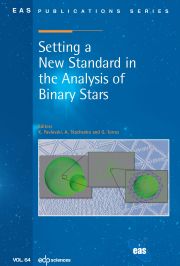No CrossRef data available.
Article contents
A new chemodynamical tool to studythe evolution of galaxies in the local Universe
Published online by Cambridge University Press: 21 April 2007
Abstract
We present some preliminary results obtained with a new galacticchemodynamical tool under development. In the framework ofnon-instantaneous recycling approach, we follow the interactions dueto star formation and feedback processes.One of the main original features of our code is that we record theabundance evolution of several chemical elements. This allows us tobuild cooling functions dependent on the real abundances of individualelements. We illustrate the need for such metal-dependent coolingfunctions using a toy model made of a star cluster embedded in atwo-phase gas cloud. Our results suggest that computing cooling ratesaccording to individual abundances of chemical elements can influencethe star formation rate.
- Type
- Research Article
- Information
- Copyright
- © EAS, EDP Sciences, 2007


